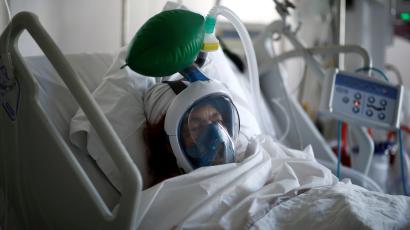London’s temporary hospital set up to deal with coronavirus had to turn 30 patients away due to “staffing issues”, The Guardian reported Wednesday, but the government insisted the claims were “misleading”.
A planned transfer of seriously-ill patients to the 4,000-bed Nightingale Hospital in east London was “cancelled due to staffing issues”, according to NHS documents seen by the newspaper.
Staff at the facility, which has treated 41 patients since opening earlier this month, told the paper that they couldn’t get enough critical care nurses based in other hospitals to work there.
But the government called the claims “misleading”, saying the hospital was ony intended as an emergency overflow if other facilities in the capital became overwhelmed.
“It is misleading to suggest coronavirus patients are being turned away from NHS Nightingale due to a shortage of staff,” said the health department.
“NHS Nightingale has been set up to treat patients if the NHS was overwhelmed but thanks to the great work of selfless NHS staff, there is spare capacity in existing London hospitals to treat all coronavirus patients there instead.”
An unnamed NHS leader told The Guardian that “we thought that London would be Italy and there would be more patients needing level 3 intensive care treatment by this stage.
“But the expected doubling every three days in the number of patients needing to be admitted to ICU didn’t happen.”
Prince Charles opened the facility, at a convention centre in London’s former industrial docklands area, in a high profile ceremony on April 3.
NHS England’s regional director David Sloman said this week that without the facility, London would face a “perfect storm of insufficient critical care capacity” when normal services are phased back in.
“When social distancing is relaxed, our plans for the future of London’s healthcare will rely upon new models of care and treatment,” he reportedly wrote in a leaked letter to health authorities in the capital.
He added that it would see “sustained reliance on the expert site for critical care that the NHS Nightingale Hospital will provide”.(AFP)

 Join Daily Trust WhatsApp Community For Quick Access To News and Happenings Around You.
Join Daily Trust WhatsApp Community For Quick Access To News and Happenings Around You.


